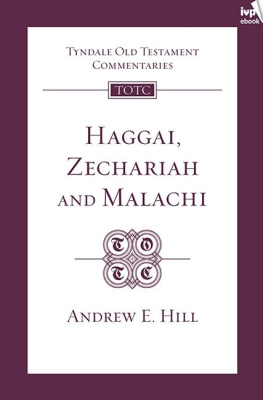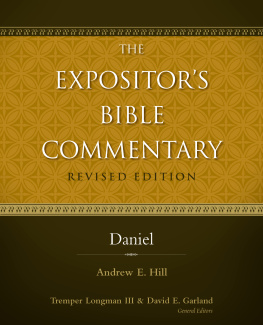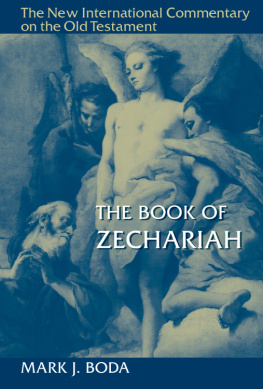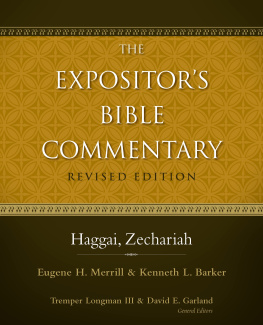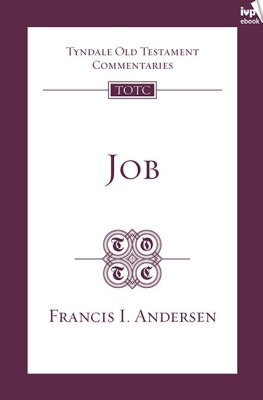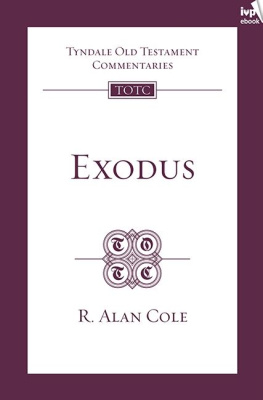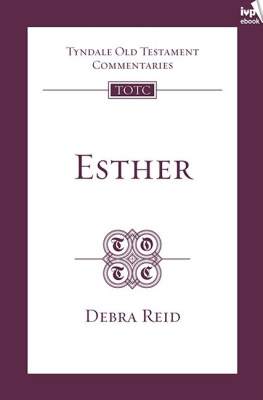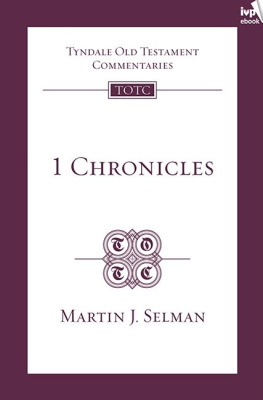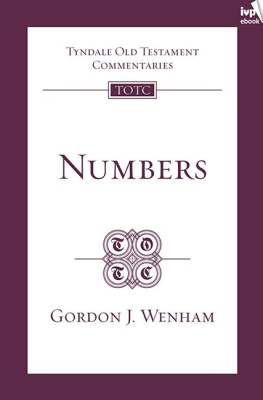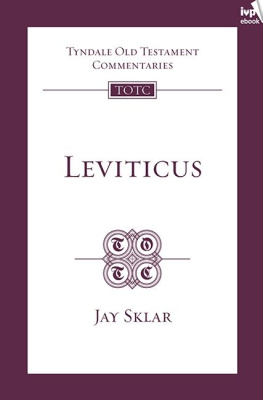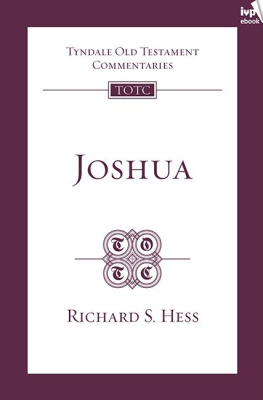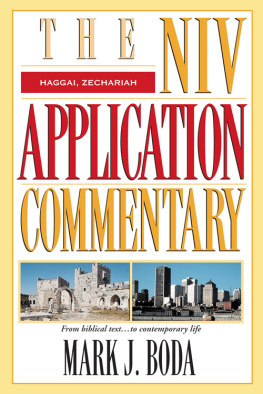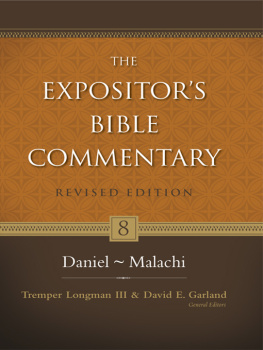Andrew E. Hill - Haggai, Zechariah & Malachi (TOTC)
Here you can read online Andrew E. Hill - Haggai, Zechariah & Malachi (TOTC) full text of the book (entire story) in english for free. Download pdf and epub, get meaning, cover and reviews about this ebook. year: 2012, publisher: Inter-Varsity Press, genre: Religion. Description of the work, (preface) as well as reviews are available. Best literature library LitArk.com created for fans of good reading and offers a wide selection of genres:
Romance novel
Science fiction
Adventure
Detective
Science
History
Home and family
Prose
Art
Politics
Computer
Non-fiction
Religion
Business
Children
Humor
Choose a favorite category and find really read worthwhile books. Enjoy immersion in the world of imagination, feel the emotions of the characters or learn something new for yourself, make an fascinating discovery.
- Book:Haggai, Zechariah & Malachi (TOTC)
- Author:
- Publisher:Inter-Varsity Press
- Genre:
- Year:2012
- Rating:5 / 5
- Favourites:Add to favourites
- Your mark:
- 100
- 1
- 2
- 3
- 4
- 5
Haggai, Zechariah & Malachi (TOTC): summary, description and annotation
We offer to read an annotation, description, summary or preface (depends on what the author of the book "Haggai, Zechariah & Malachi (TOTC)" wrote himself). If you haven't found the necessary information about the book — write in the comments, we will try to find it.
Haggai, Zechariah & Malachi (TOTC) — read online for free the complete book (whole text) full work
Below is the text of the book, divided by pages. System saving the place of the last page read, allows you to conveniently read the book "Haggai, Zechariah & Malachi (TOTC)" online for free, without having to search again every time where you left off. Put a bookmark, and you can go to the page where you finished reading at any time.
Font size:
Interval:
Bookmark:
Volume 28
General Editor: David G. Firth
General Editor: Tremper Longman III
An Introduction and Commentary
Andrew E. Hill
2012 by Andrew E. Hill
All rights reserved. This eBook is licenced to the individual who purchased it and may not be reproduced, stored or transmitted, in any form, or by any means, electronic, mechanical, or otherwise, except for the sole, and exclusive use of the licensee, without prior permission of the publisher or the Copyright Licensing Agency.
Unless otherwise stated, quotations from the Bible are from the THE HOLY BIBLE, NEW INTERNATIONAL VERSION, NIV Copyright 1973, 1978, 1984, 2011 by Biblica, Inc. Used by permission. All rights reserved worldwide.
First published 2012
ISBN: 9781783592678
Series design: Sally Ormesher
Illustration: Kev Jones

INTER-VARSITY PRESS
Norton Street, Nottingham NG7 3HR, England
Email:
Website: www.ivpbooks.com
Inter-Varsity Press publishes Christian books that are true to the Bible and that communicate the gospel, develop discipleship and strengthen the church for its mission in the world.
Inter-Varsity Press is closely linked with the Universities and Colleges Christian Fellowship, a student movement connecting Christian Unions in universities and colleges throughout Great Britain, and a member movement of the International Fellowship of Evangelical Students. Website: www.uccf.org.uk
To our grandchildren
David, Neva, Samuel, Hudson ( in memoriam ), Christian and Lucy
The city streets will be filled with boys and girls playing
(Zech. 8:5)
Introduction
The decision completely to revise the Tyndale Old Testament Commentaries is an indication of the important role that the series has played since its opening volumes were released in the mid-1960s. They represented at that time, and have continued to represent, commentary writing that was committed both to the importance of the text of the Bible as Scripture and a desire to engage with as full a range of interpretative issues as possible without being lost in the minutiae of scholarly debate. The commentaries aimed to explain the biblical text to a generation of readers confronting models of critical scholarship and new discoveries from the Ancient Near East, while remembering that the Old Testament is not simply another text from the ancient world. Although no uniform process of exegesis was required, all the original contributors were united in their conviction that the Old Testament remains the Word of God for us today. That the original volumes fulfilled this role is evident from the way in which they continue to be used in so many parts of the world.
A crucial element of the original series was that it should offer an up-to-date reading of the text, and it is precisely for this reason that new volumes are required. The questions confronting readers in the first half of the twenty-first century are not necessarily those from the second half of the twentieth. Discoveries from the Ancient Near East continue to shed new light on the Old Testament, whilst emphases in exegesis have changed markedly. Whilst remaining true to the goals of the initial volumes, the need for contemporary study of the text requires that the series as a whole be updated. This updating is not simply a matter of commissioning new volumes to replace the old. We have also taken the opportunity to update the format of the series to reflect a key emphasis from linguistics, which is that texts communicate in larger blocks rather than in shorter segments such as individual verses. Because of this, the treatment of each section of the text includes three segments. First, a short note on Context is offered, placing the passage under consideration in its literary setting within the book, as well as noting any historical issues crucial to interpretation. The Comment segment then follows the traditional structure of the commentary, offering exegesis of the various components of a passage. Finally, a brief comment is made on Meaning, by which is meant the message that the passage seeks to communicate within the book, highlighting its key theological themes. This section brings together the detail of the Comment to show how the passage under consideration seeks to communicate as a whole.
Our prayer is that these new volumes will continue the rich heritage of the Tyndale Old Testament Commentaries, and that they will continue to witness to the God who is made known in the text.
David G. Firth, Series Editor
Tremper Longman III, Consulting Editor
Haggai, Zechariah and Malachi preached to audiences who were jaded by the lack of relevance of organized religion to their daily economic and social life. They were self-absorbed, preoccupied with personal agendas, bent on comparing themselves with others, questioning the fairness of life, looking for an edge, pursuing material rather than spiritual things, morally ambivalent, apathetic with respect to civil responsibility, hypocritical with regard to religious practice, chasing much but grasping little and the list goes on. Sound familiar?
The crisis of relevance persists today in numerous ways and at a variety of levels. Our three prophets sought to remedy the crisis of the relevance of the religion of YHWH for the people of God living in post-exilic Judah by calling them to return to God (Zech. 1:3; Mal. 3:7). Much of the teaching of Haggai, Zechariah and Malachi still has currency for the people of God dealing with the various crises of relevance in our contemporary culture. Their sermons remain an open invitation to be still before the L ORD (Zech. 2:13), to seek the L ORD Almighty (Zech. 8:22), and to come to understand and acknowledge that YHWH is a great king (Mal. 1:14). In short, they continue to call us to return to God godly repentance is always relevant.
I am honoured to stand on the shoulders of such an able scholar as the late Joyce G. Baldwin. Over the years, I have personally and professionally benefited from her TOTC commentaries, first as a seminarian, later as a graduate student, and now as a professor of biblical studies. As a credit to her careful and insightful scholarship, I have intentionally made wide appeal to her analysis, where appropriate. I trust this iteration of the TOTC on the books of Haggai, Zechariah and Malachi will serve the next generation of students and pastor-teachers equally well.
The New International Version ( NIV ) is the baseline English translation used for the commentary, and quotations from this version are given in italics. Other English versions are referenced where helpful, including the NIV 2011 edition when pertinent. Bible translation is necessarily interpretive in many instances, so the broad engagement with an array of English versions brings both breadth of perspective and depth of understanding to the analysis of particular verses of Scripture. Numerous insightful and readable commentaries are available on the books of Haggai, Zechariah and Malachi. I have benefited from this excellent scholarship and have attempted to interact with these resources (cited in the Select bibliography for each book) in such a way that the reader gains an understanding of the biblical text, informed by a variety of voices.
Special attention is given to intertextual relationships in our analysis, since each of the three prophets often appeal (whether directly or indirectly) to the messages of their earlier counterparts. We read the Bible as theology (the
Font size:
Interval:
Bookmark:
Similar books «Haggai, Zechariah & Malachi (TOTC)»
Look at similar books to Haggai, Zechariah & Malachi (TOTC). We have selected literature similar in name and meaning in the hope of providing readers with more options to find new, interesting, not yet read works.
Discussion, reviews of the book Haggai, Zechariah & Malachi (TOTC) and just readers' own opinions. Leave your comments, write what you think about the work, its meaning or the main characters. Specify what exactly you liked and what you didn't like, and why you think so.

